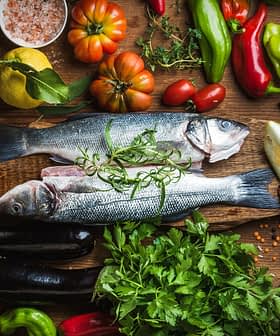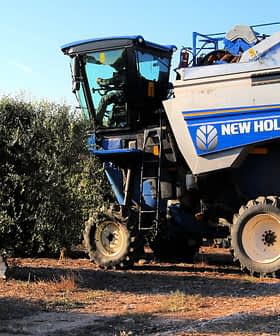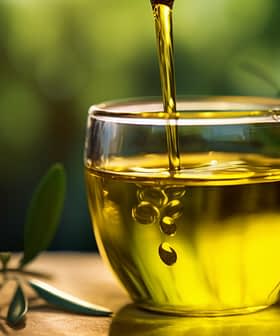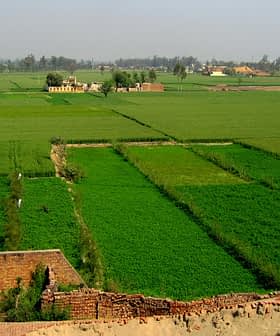At Hacienda Guzman, Promoting Olive Culture by Celebrating its Diversity
Juan Ramón Guillén began bringing back saplings of different varieties of olive trees from his travels. Now, his 'Olivotheque' is among the largest collections of olive cultivars in the world.
 Ana Sanchez
Ana Sanchez The Olivotheque at the Hacienda Guzmán in Seville is a botanical garden with 150 varieties of olive trees from 13 countries, making it one of the largest collections of cultivars in the world. The Juan Ramón Guillén Foundation aims to promote olive oil culture through this project, which also includes educational initiatives for schoolchildren and research on the properties of different olive varieties. Additionally, the foundation is working towards registering the Andalusian olive landscape as a UNESCO World Heritage site to preserve the traditions and values associated with the sector.
Walking along the lines of olive trees of the Olivotheque at the Hacienda Guzmán, one can travel around the olive oil world without moving from this estate in Seville.
This sort of botanical garden with 150 varieties of olive trees from 13 countries is a world map of the diversity of the Olea Europea.
Some 30 years ago, Juan Ramón Guillén, a long-time olive oil producer and businessman, began bringing back saplings of different varieties of olive trees from his travels.
Now, his collection is among the largest collections of cultivars of olive trees in the world.
It is one of the main projects of the Juan Ramón Foundation, an organization intended to promote olive oil culture: what started out of passion and pleasure took then a new scientific and educational turn.
We meet Ana Sánchez, general coordinator of the foundation, at the entrance of Haciencia Guzmán.
“This is a living olive trees museum. Our aim is to study and analyze the properties of each cultivar. Every harvest, every year, we analyze the performance and the properties of every variety: their level of polyphenols, their level of antioxidants…” she told Olive Oil Times.
This sixteenth-century estate just 15 km away from Seville was once was managed by Hernando Colombus, the son of Christopher Colombus, and played a relevant role in the first exports of olive oil to the Americas.
It still is a place devoted to olive oil: from the recently restored mill to the modern facilities where Hacienda Guzmán extra virgin olive oil (a commercial project that runs in parallel to the foundation) is produced.
The Olivotheque — an orchard-like olive tree arboretum — lies in front of the white and red Andalusian-style mansion.
A visitor can observe the different shapes and colors of the leaves and compare the bunches of tiny Arbequinas from Catalonia with the egg-sized Italian Uovo di Pichone olives, the Portuguese Cobrancosa, the Syrian Chami or the Turkish Kan Celebi.
Some of these cultivars — such as the Greek Koroneikis or the Nabali from Israel — are exalted for their oil in their countries of origin.
Others, like the big Gordal olives are mainly table olives with very little oil interest. Some are simply ornamental, as the Zarza, a variety whose brain-shaped fruits seem to suffer some kind of malformation.
“This is what interests us: to see how each cultivar reacts to this soil, to this region, and to this climate. Because we may be surprised and there may be a variety from a different country which works very well here,” Sánchez pointed out.
Olives at the Olivotheque are handpicked and brought to the mill with the rest of the production of the estate.
A small amount of oil is produced from them for research purposes, but it is not for sale. These trees — being pieces of a “museum” — are also treated differently from those in the rest of the estate.
“They are not trimmed. The objective is that this is a botanical garden and to see how they react,” Sánchez explained.
The World Catalogue of Olive varieties, published by the International Olive Council — an intergovernmental organization of most olive oil-producing countries — features 139 olive cultivars. Beyond those “basic” ones, however, there are hundreds more.
Gathering them all in one single place seems to be an ambitious mission.
In Spain alone, there are more than 250 cultivars, even though just 20 of them are widely spread, and over 60 percent of the country’s olive oil production comes from just a few: Picual, Arbequina, Cornicabra, Hojiblanca, Empeltre, Picudo.
“Our research began in 2011 and 2012, so we are starting to see the results now,” Sánchez said.
“We’ve obtained good results especially with the Lechín variety, which is a cultivar that we don’t grow at the estate, but we see has very positive properties. Also the Arbosana, which is a variety that has a very nice flavor and gives a very scented oil. And the Frantoio as well. It’s an Italian cultivar which is responding very well to this land,” she added.
Educating the public and spreading the richness of the olive oil culture is also one of the objectives of the foundation and the Olivotheque.
Schoolchildren come here to learn about this diversity and how olive oil is produced, as well as about its benefits for their health.
“They start with a small tasting where they compare for instance Arbequina oil with Picual oil, which are very different. Then they choose which one they like the most and they have a healthy breakfast. Here in Spain we have the habit of consuming olive oil, but very often we are not aware of its benefits,” Sánchez remarked.
Beyond the Olivotheque and its educational projects, the Juan Ramón Guillén Foundation is promoting the Andalusian bid to register its olive landscape as a UNESCO World Heritage site.
This is a long-term project that started in 2012 and, if successful, may reach to an end in the summer of 2020.
“This is something intangible. It encompasses five provinces in Southern Spain: Córdoba, Granada, Jaén, Málaga and Sevilla,” Sánchez explains.
“We are talking about the olive groves here, but also about the professions that are linked to them, traditions, construction, architecture, gastronomy… everything that surrounds the sector. So, in the end, it would end up being a way to ensure that these traditions are not lost. That this value is not lost.”
Share this article
















